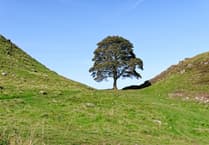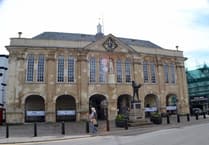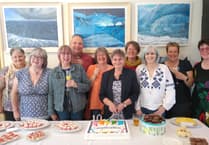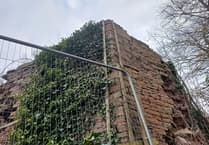PROFESSROR Dame Jenny Harries has told the public UK Covid 19 inquiry that she never expected to be standing next to the prime minister addressing the nation about the pandemic on live TV.
The former England deputy chief medical officer, who lives in Monmouth, told the inquiry yesterday afternoon (Tuesday, December 29) that standing at No 10 next to the prime minister or chancellor in the middle of a global pandemic was “something that clearly I had not expected”.
Harries, who was educated at Monmouth School for Girls and is currently chief executive of the UK Health Security Agency (UKHSA), added that her role was that of an adviser, and as "somebody to try and support public understanding”, not about defending government policy.
"I will not have been in the same meetings as [England's chief medical officer Chris Whitty] would have been, or other colleagues making strategic decisions; and yet it may well be me standing on the podium," she says.
She always tried to give the "right messages" at a "very, very frightening time for many members of the public", she replied in answer to a question about whether she had put a 'positive spin' on the situation.
It was important to "reduce what you're saying in ways that are simpler and less scientifically detailed but nevertheless gets the key public health message across", she said.
Inquiry lawyer Andrew O'Connor KC asked her if she was guilty of "over confidence" in the UK's preparadness to fight the pandemic at the start of 2020, and cited an email she sent saying we were better equipped than the first European nation to be badly hit, Italy.
Harries said she may have “read too much” into the difference in the health systems of the UK and Italy, but was referring to the way the latter's system was organised "rather than the fact, actually, that the virus was going to be so problematic".
She said "an external objective assessment" had ranked the UK second out of 100 countries in prepardeness to fight a pandemic, but "in retrospect it feels wrong".
Asked about saying "the country has a perfectly adequate supply of PPE" in March 2020, Harries said she had "no direct responsibility for PPE at all" and had to rely on information provided to her.
She was told a new supply system for getting PPE was in place "and that turned out to not be the case".
"In fact I apologised as soon as I could when I was next on the stand... which is a relatively unusual thing to do from a political stand but it was something I felt I needed to do," she says.
Harries says she also encouraged the World Health Organisation’s message of "test, test, test" early on in the pandemic.
But the UK was struggling to test everyone because “at this point we had no more tests”, she says.
She was referred to an article where she was quoted as saying: "The key, she says, is to be transparent about the risks and build trust with the public."
Harries told the inquiry her comments were based "particularly around data", and said the public were "brilliant during the pandemic and they complied often with mandated requirements".
But with the Omicron Covid variant at the time there ware no mandated requirements but people could see the data and "then they took actions themselves".
She said the UKHSA is now trying to build dashboards so people can see what's happening and make their own choices.
She continues her evidence to the inquiry today.




Comments
This article has no comments yet. Be the first to leave a comment.